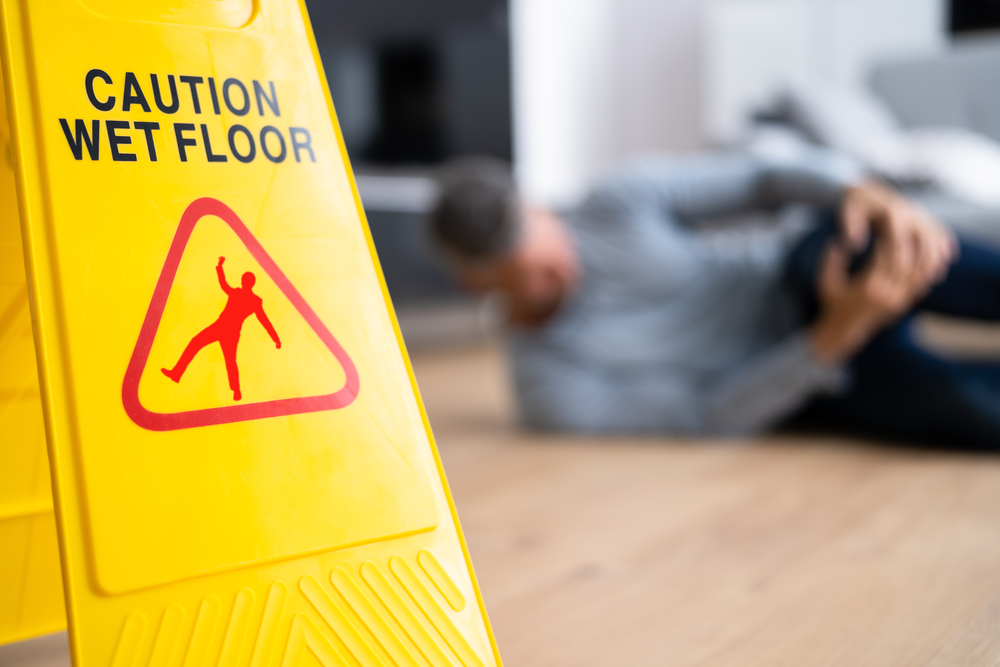 If a customer is injured on your commercial property, there can be claims of premises liability that may lead to a lawsuit, or at the very least, increases in your property insurance rates. As the saying goes, “An ounce of prevention is worth a pound of cure,” and one of the first steps in preventing customer injuries on your commercial property is to understand how those injuries are most likely to occur. Keep reading to learn about some common issues that lead to these kinds of injuries.
If a customer is injured on your commercial property, there can be claims of premises liability that may lead to a lawsuit, or at the very least, increases in your property insurance rates. As the saying goes, “An ounce of prevention is worth a pound of cure,” and one of the first steps in preventing customer injuries on your commercial property is to understand how those injuries are most likely to occur. Keep reading to learn about some common issues that lead to these kinds of injuries.
Wet Floors
Many commercial properties have hard flooring, which is easier to maintain and clean than carpeting. However, it also becomes quite slippery when wet. Whether the floors have just been cleaned or there’s a recent spill, a wet floor can be quite hazardous for anyone walking by who doesn’t notice the dangerous condition. Of course, wet floors are bound to happen, but as the property owner, it is your responsibility to ensure that spills are cleaned up in a timely manner, and that “Wet Floor” signs are used any time slippery conditions exist.
If a customer slips and falls on a new spill that you could not have reasonably cleaned up yet, then your liability in the customer’s injuries would be less severe. However, if the spill has been present for an extended period, or the floors were mopped and no warning sign was posted, these are instances in which your business may be held liable.
Uneven or Damaged Flooring
Not only is it your responsibility to warn customers of potentially slippery flooring, but it’s also your responsibility to maintain the flooring so that it is safe to walk on. If the flooring becomes damaged in some way, it should be repaired in a timely manner. If a small imperfection in the flooring creates a tripping hazard that you cannot immediately repair, a sign should be posted warning customers to watch their step in that area. If you do not properly maintain your property, and this creates hazardous conditions for customers visiting your place of business that result in an injury, you will likely be held liable for those injuries.
Slippery Sidewalks
Of course, indoor floors aren’t the only ones that can be slippery. Your premises liability extends beyond the walls of your building, and includes any exterior steps and the sidewalks that run in front of your property. It is your responsibility to maintain those sidewalks and keep them clear of snow and ice during the winter. If the sidewalks or stairs in front of your property become slick, and a customer (or even a passerby) slips and falls, you could be held liable for their injuries due to your failure to property maintain the exterior of your business.
Bad Lighting
Sometimes, injuries occur simply because a customer couldn’t see a hazard in their path. If this happens because the customer is distracted by something, then a business owner can hardly be held liable for the resulting injuries. However, what if the customer couldn’t see the hazard because your business is poorly lit? Some businesses may wish to use dimmer lighting to evoke a certain mood on the premises. However, bad lighting can make it more difficult for customers to move safely about your store. They may not see the single step down, or the item that has fallen off a shelf and into their path, causing them to trip and fall. If it can be clearly proven that the injuries are at least partially due to the poor lighting in your business, you may be on the hook for a portion of their medical bills.
Cluttered Walkways
Every business owner should strive for a tidy, well maintained facility. Not only does this create the impression of professionalism, but it also creates a safer environment for your customers. Make sure that walkways are wide enough for customers to move easily through them in both directions, without having to worry about tripping over chair legs or product displays. Make a point of clearing the walkways of any dropped items regularly, and avoid running any cables across these areas. These create tripping hazards that may result in customer injuries.
What to Do If a Customer Is Injured
If a customer has been injured on your property and is claiming that you are liable, you should speak to a premises liability attorney right away to discuss your case and whether or not you can be held financially responsible for those injuries. Contact The Harr Law Firm today to schedule a consultation with one of our attorneys.